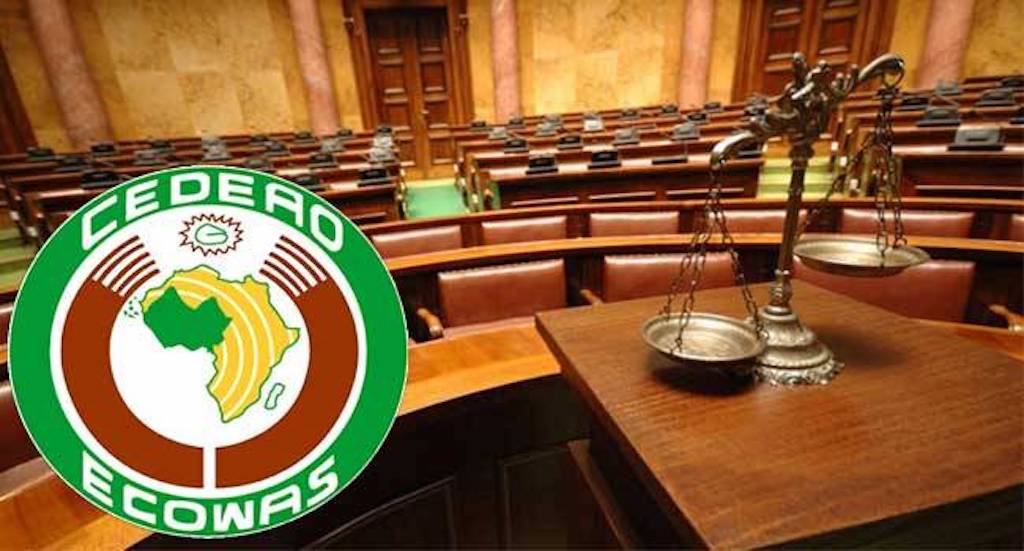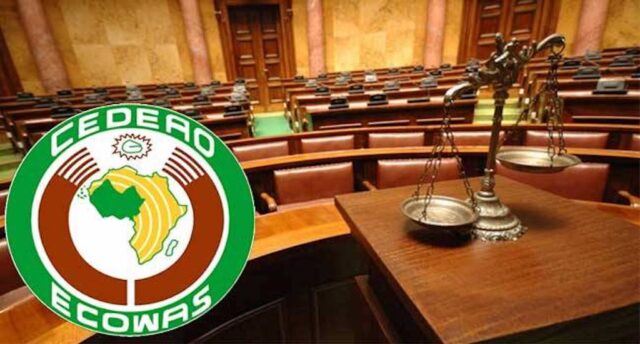
The ECOWAS Court has fixed 27 September for judgement in a suit challenging some provisions of the Nigerian government’s national broadcasting code.
The contested provisions of the code empower the National Broadcasting Commission (NBC) to impose fines on any erring Nigerian broadcast station. The NBC can shut down broadcasting stations that fail to comply with its sanctions.
Major Nigerian broadcast stations have been strained by exorbitant fines for breaches of the code in the last few years, some of which have triggered court actions.
Coincidentally, a Nigerian court, in a judgement on Wednesday, invalidated NBC’s power of to impose fines on the country’s broadcast stations.
A panel of the ECOWAS Court led by Dupe Atoki had heard a case filed in 2020 on a similar matter on Monday (8 September), a statement by the court’s information unit stated Wednesday.
The court picked 27 September to deliver its judgement after the hearing.
Plaintiff’s case
The plaintiff in the ECOWAS Court case, the Expression Now Human Rights Initiative (ENHRI), a non-governmental organisation, had filed the suit alleging that aspects of the broadcasting code of Nigeria encroached on the rights of a free media which should operate freely without “undue interference.”
The organisation, which says it is concerned with the protection and promotion of human rights, maintained in its suit that the NBC Code is used to suppress the right of citizens to freedom of expression.
ENHRI told the ECOWAS Court that NBC arbitrarily issued letters of alleged violation of the code on broadcasters, while also imposing sanctions, thereby acting as complainant and judge.
The organisation filed its suit marked ECW/CCJ/APP/35/20 filed on 4 September 2020, citing the allegedly offensive aspects of the code to include Articles 3.1.1, 3.1.2, 15.2.1 and 15.2.1 of its 6th Edition and Articles 11.5.1 of the amendments to the 6th Edition.
Its lawyer, Solomon Okedara, argued that the cited aspect of the code suppressed its rights to freedom of expression as well as those of its associates and collaborators.
The NGO added that this amounted to a violation of Articles 9 and 19 of the African Charter on Human and Peoples Rights (ACHPR) and Article 19 of the International Convention on Civil and Political Rights (ICCPR).
Mr Okedara added that NBC Code and its amended version were alien to a democratic society and that the Code’s definition of “hate speech” and “offensive reference” is vague and ambiguous, and described the sanctions for violations as disproportionate and excessive.
He contended that the NBC Code did not provide broadcasters with any avenue or platform to be heard before the imposition of sanctions.
He urged the court to determine the legality of the stated Articles of the Code, the amendments, and the powers of the NBC to impose sanctions especially exorbitant fines particularly in relation to the context of “offensive reference” and “hate speech.
Among its prayers, the plaintiff urged the court to declare that the stated provisions of the Code, its amendments and sanctions/fines, breached Nigeria’s obligation under international laws and treaties to which it is a signatory.
Counter-argument
In a counterargument, the Nigerian government’s counsel, I.I. Hassan, told the court that the NBC was established to regulate the broadcast industry in line with its mandate to ensure standard broadcast content.
He added that the Nigerian Constitution makes provisions for sufficient safeguards for human rights.
He said the right to freedom of speech is not absolute and can be curtailed as opposed to under appropriate circumstances. He said, for instance, a person or organisation cannot commit slander or libel under the pretext of exercising freedom of expression.
He urged the court to dismiss the case describing the allegations as unfounded and speculative as the NGO did not establish that it suffered from the alleged violation.
Earlier on 2 May, the presiding judge, Ms Atoki, had informed both parties of a change in the panel of judges following the replacement of two judges whose tenure in the court had ended.
The matter had been adjourned for judgement before the exit of the two judges. But because they could not deliver their judgement before their exit, parties to the suit had to make their final submission before the new panel.
The case was eventually heard on 8 May.
Apart from Ms Atoki, the two other judges on the panel are Sengu Mohamed Koroma and Ricardo Cláudio Monteiro Gonçalves.
Controversial restrictions
The NBC has come under criticism in the last few years over what is widely seen as its increasingly strangling restrictions on broadcast stations.
Press freedom and human rights activists have described NBC’s sanctions as arbitrary actions which feed into the broader climate of information blackout and disregard for the rule of law by the President Muhammadu Buhari administration.
The agency has hit many broadcast stations with exorbitant fines for various breaches of the broadcasting code, including the promotion of hate speech – a hazy concept that many rights activists argue is being deployed to curtail free press.
The controversial actions of the NBC have triggered a slew of legal actions in the last few years, some of which have been dismissed, while others are pending in court.
The ECOWAS Court has the records of ruling against member states including Nigeria in human rights cases, the only subject matter the court’s jurisdiction covers. But the implementation of the court’s decisions has always been an issue.
In March last year, the court ordered the Nigerian government to amend the controversial section 24 of its cybercrime law which is widely viewed as authorities’ weapon for muzzling citizens’ rights to freedom of expression. The Nigerian government has yet to show a willingness to implement the court’s decision.







